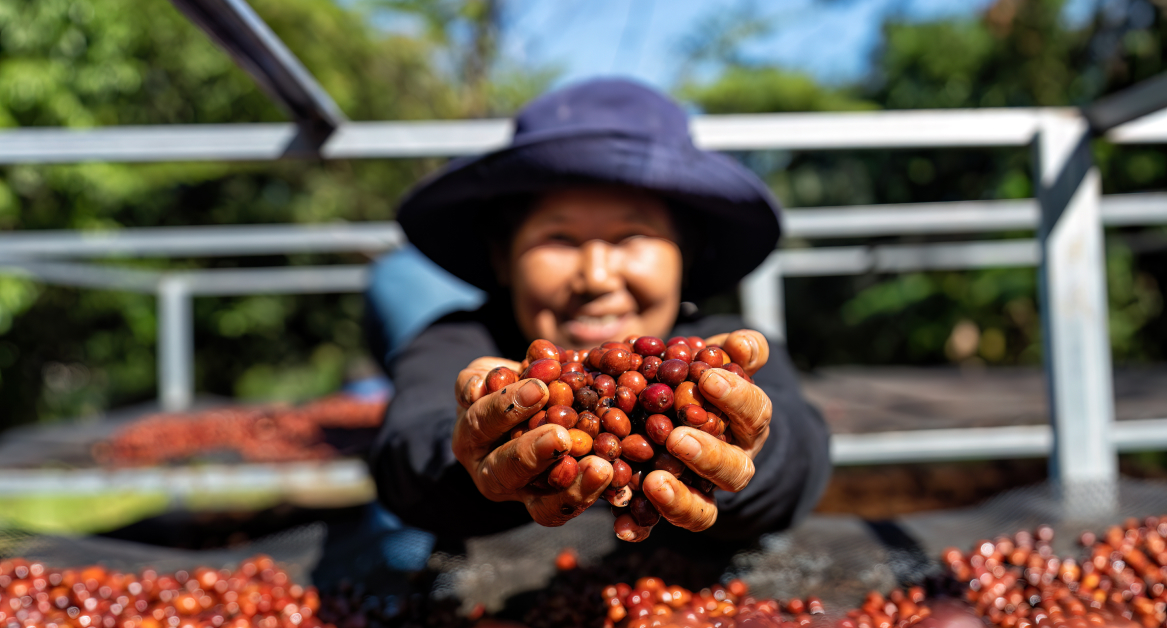As environmental concerns are at global discussions, the European Union has taken a significant step towards combatting deforestation and forest degradation – by giving out the European Union Deforestation Regulation (EUDR).
The regulation is designed to address the complex issue of deforestation and promote the responsible sourcing of commodities. If you’re involved in the supply chain, it’s essential to understand how this regulation affects your business.
EUDR commodities play a crucial role in the EU market, covering a range of products and raw materials. In this comprehensive guide, we will learn how the regulation is applied to the seven key commodities: Cattle, Cocoa, Coffee, Oil palm, Rubber, Soya, and Wood.
7 key commodities under EU Deforestation Regulation

1. Cattle:
The EU Deforestation Regulation has recognized cattle ranching’s significant involvement in deforestation and forest degradation.
Cattle ranching has long been associated with clearing land for pasture, which can lead to deforestation and harm to local ecosystems. To address this issue, the regulation outlines specific requirements for businesses involved in the cattle supply chain.
Compliance requirements:
For businesses dealing with cattle, compliance with the EUDR is crucial. The regulation mandates that operators and traders sourcing cattle products must conduct due diligence to ensure that these products have not contributed to deforestation or illegal logging.
This due diligence process involves gathering information on the products’ origin, verifying their compliance with relevant legislation in the country of production, and assessing their impact on deforestation.
Sustainable practices:
Promoting sustainable cattle farming and sourcing is key to complying with the EUDR. To meet these regulations and contribute to sustainable practices, consider the following:
- Traceability: Implement robust traceability systems to track the origin of cattle products throughout the supply chain. This ensures transparency and accountability.
- Certification: Look for certification schemes, such as those offered by organizations like the Roundtable on Sustainable Beef (RSB), that promote responsible cattle farming practices.
- Alternative feed: Explore the use of sustainable feed alternatives, such as those made from agricultural residues, to reduce the environmental impact of cattle farming.
- Forest conservation: Consider supporting reforestation or afforestation projects to offset any deforestation associated with your cattle products.
By adhering to these practices, businesses can not only meet EUDR requirements but also contribute to the conservation of forests and the promotion of sustainable cattle farming.
2. Cocoa:
Cocoa, the primary ingredient in chocolate production, is one of the commodities closely monitored by the EUDR. Cocoa cultivation often occurs in regions where deforestation and forest degradation are significant concerns. The regulation seeks to address the environmental and social impacts of cocoa production.
Compliance requirements:
Companies involved in the cocoa supply chain must conduct due diligence to ensure compliance with the EUDR. This involves assessing the impact of cocoa production on deforestation and verifying that relevant legislation in the country of production is followed.
Sustainable practices:
To navigate the EUDR while promoting sustainable cocoa sourcing, consider the following practices:
- Certified cocoa: Opt for cocoa sourced from certified farms that adhere to sustainable and ethical practices, such as Fair Trade or Rainforest Alliance certifications.
- Agroforestry: Encourage cocoa farmers to adopt agroforestry practices, which involve planting cocoa trees alongside native trees. This helps preserve biodiversity and reduce deforestation.
- Community engagement: Support initiatives that empower cocoa-producing communities, ensuring fair wages and social development.
- Supply chain transparency: Implement transparent supply chain tracking systems to trace the origin of cocoa products and verify their compliance with regulations.
3. Oil Palm:
Oil palm cultivation has been a significant driver of deforestation in regions such as Southeast Asia. The EUDR addresses this issue by targeting oil palm and its derivatives.
Compliance requirements:
Businesses dealing with oil palm products must conduct due diligence to ensure compliance with the EUDR. This includes assessing the impact of oil palm production on deforestation and verifying adherence to relevant legislation in the country of production.
Sustainable practices:
To align with the EUDR while promoting sustainable oil palm sourcing, consider these practices:
- Certification: Source palm oil from certified sustainable plantations, such as those certified by the Roundtable on Sustainable Palm Oil (RSPO).
- Deforestation-free pledges: Work with suppliers that have committed to deforestation-free palm oil production.
- Smallholder support: Support smallholder farmers in adopting sustainable and responsible palm oil farming practices.
- Transparency: Implement transparency measures in your supply chain to trace the origin of palm oil products.
4. Rubber:
While rubber may not be as commonly associated with deforestation as some other commodities, the EUDR recognizes its potential impact on forested areas, especially in Southeast Asia. The regulation includes requirements for businesses involved in the rubber supply chain.
Compliance requirements:
Companies dealing with rubber products must conduct due diligence to ensure compliance with the EUDR. This includes assessing the impact of rubber production on deforestation and verifying adherence to relevant legislation in the country of production.
Sustainable practices:
To navigate the EUDR while promoting sustainable rubber sourcing, consider these practices:
- Certification: Source rubber from certified sustainable plantations that follow responsible land-use practices.
- Agroforestry: Encourage rubber producers to adopt agroforestry techniques that promote biodiversity and reduce deforestation.
- Supply chain transparency: Implement transparent supply chain tracking systems to trace the origin of rubber products.
- Community engagement: Support initiatives that empower local rubber-producing communities and promote sustainable practices.
5. Coffee:
Coffee is a beloved beverage enjoyed worldwide, but its production can have a significant environmental impact, including deforestation. The EUDR aims to address these concerns by including coffee as one of the commodities under its scrutiny.
Compliance requirements:
For businesses involved in the coffee supply chain, adherence to the EUDR is crucial. Due diligence is required to assess the impact of coffee production on deforestation and ensure compliance with relevant legislation in the country of production.
Sustainable practices:
To align with the EUDR while promoting sustainable coffee sourcing, consider these practices:
- Certification: Source coffee beans from certified sustainable farms, such as those certified by Fair Trade or the Rainforest Alliance.
- Shade-grown coffee: Encourage the cultivation of shade-grown coffee, which involves planting coffee bushes under the canopy of existing trees, and preserving forest cover.
- Support smallholders: Work with small-scale coffee farmers to improve their sustainable farming practices and livelihoods.
- Supply chain transparency: Implement transparent supply chain tracking systems to trace the origin of coffee products and verify their compliance with regulations.
6. Soya:
Soya, a versatile and widely used commodity, is also under the scrutiny of the EUDR. Soya cultivation can lead to deforestation, especially in South America, where vast tracts of land are cleared for soybean production.
Compliance requirements:
Businesses dealing with soya products must conduct due diligence to ensure compliance with the EUDR. This involves assessing the impact of soya production on deforestation and verifying adherence to relevant legislation in the country of production.
Sustainable practices:
To navigate the EUDR while promoting sustainable soya sourcing, consider these practices:
- Certified soya: Source soya from farms that adhere to responsible and sustainable farming practices, such as those certified by the Round Table on Responsible Soy (RTRS).
- Zero-deforestation commitments: Collaborate with suppliers who have made commitments to zero-deforestation soybean production.
- Supply chain transparency: Implement transparent supply chain tracking systems to trace the origin of soya products.
- Alternatives: Explore alternatives to traditional soybean production, such as sustainable plant-based proteins or other protein sources.
7. Wood:
The EUDR recognizes the critical role of the wood industry in deforestation and forest degradation. It addresses the impact of wood and wood products on deforestation, making it vital for businesses in this sector to comply.
Compliance requirements:
Companies involved in the wood industry must conduct due diligence to ensure compliance with the EUDR. This involves assessing the impact of wood production on deforestation and verifying adherence to relevant legislation in the country of production.
Sustainable practices:
To navigate the EUDR while promoting sustainable wood sourcing, consider these practices:
- Certified wood: Source wood and wood products from certified sustainable forestry operations, such as those certified by the Forest Stewardship Council (FSC).
- Recycling: Promote the use of recycled wood products to reduce the demand for newly harvested timber.
- Supply chain transparency: Implement transparent supply chain tracking systems to trace the origin of wood products.
- Legal compliance: Ensure that all wood products comply with the relevant legislation in the country of production.
Leveraging RegenX for sustainable and compliant sourcing
As we’ve journeyed through the intricate landscape of EUDR commodities, it becomes evident that the EU Deforestation Regulation is a significant step toward promoting responsible sourcing and curbing deforestation. Compliance with these regulations is not only a legal requirement but also an ethical imperative.
To follow these regulations, EU businesses must prioritize sustainable and compliant sourcing practices. This involves conducting due diligence, adhering to relevant legislation in the country of production, and actively seeking ways to minimize their environmental footprint.
And this is what RegenX’s vision was founded upon. RegenX empowers global buyers to source toxic-free and traceable commodities directly from regenerative farming regions. This not only rewards farmers with higher prices but also promotes post-harvesting guidance and regenerative agriculture monitoring.
✔ Source form certified farms
✔ Traceability
✔ Agroforestry
✔ Smallholder Support
✔ Community Engagement
By aligning with EUDR, adopting sustainability, and partnering with RegenX, businesses can lead the charge in preserving our planet’s ecosystems while securing their ethical and sustainable supply chain position.
Decisions today shape a greener tomorrow. Contact us now!



